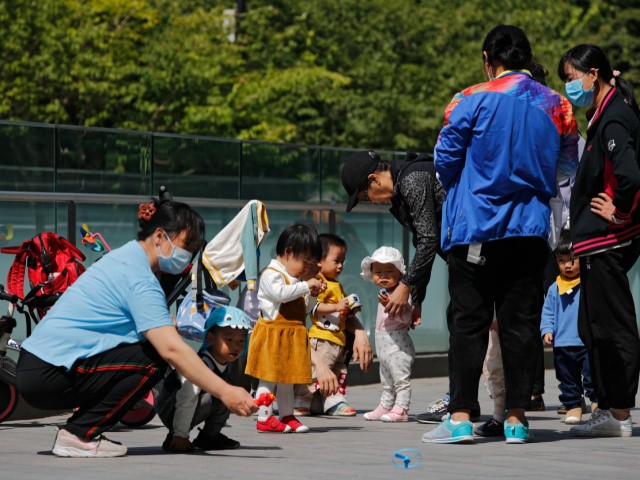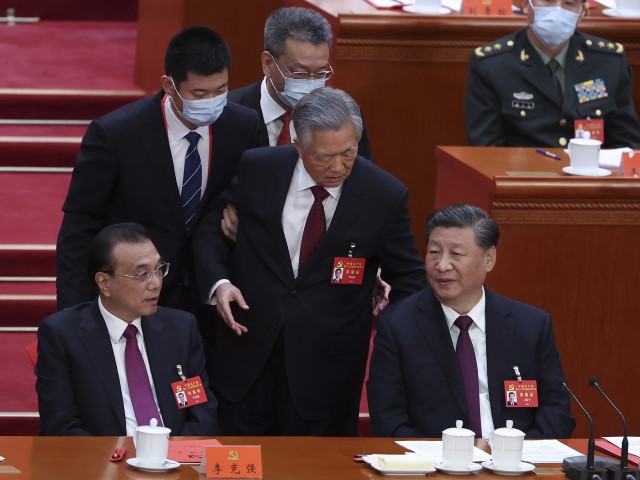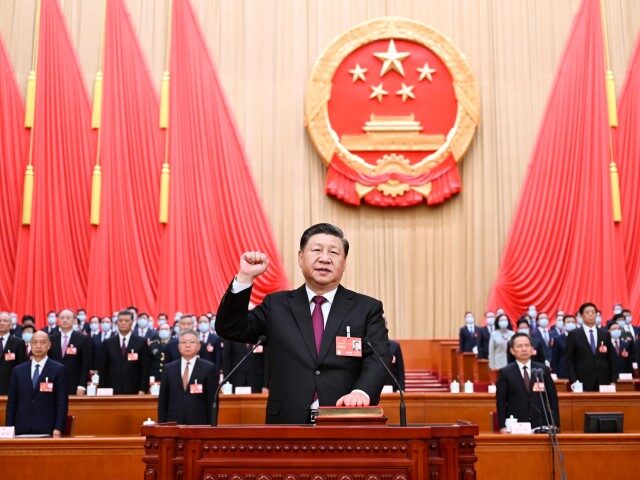The Chinese National People’s Congress (NPC) unanimously “elected” communist dictator Xi Jinping to a third term as president, as well as head of the nation’s military, on Friday, an entirely expected result as Xi had no competition for the title.
A totalitarian regime, China does not allow the public any say in who its national leaders are. Instead, Communist Party elite handpick lawmakers, local and provincial-level officials, and those among their own ranks. Xi’s total control of the Chinese government was cemented in last October’s Communist Party Congress, a convention occurring every five years in which the Party, the only political party in the country with any authority, chooses the members of its elite Politburo and its chairman – a title Xi handily walked away with. The new Politburo chosen in October was full of longtime Xi loyalists and members of advanced age – the youngest member being 60 years old – preventing the rise of any potential challengers or successors to the dictator.
China’s state-run Xinhua News Agency reported on Friday that Xi was elected “unanimously” as the nation’s president, meaning none of the nearly 3,000 members of the NPC lawmaking body dared defy him.
As the South China Morning Post recalled, Xi was similarly unanimously “elected” to the presidency in 2018. “President” is one of the weaker titles that Xi controls, as he is also the Communist Party chairman and head of the armed forces, among other political roles.
“He has consolidated so much power and now put in place a new team made up of his trusted men,” Singapore professor Alfred Wu told the Morning Post.
The NPC is currently in session, alongside the Chinese People’s Political Consultative Conference (CPPCC), the national-level legislative entities of China. The “two sessions,” as the regime refers to them, occur every year and allow the handpicked lawmakers in each body to draft and approve laws with no room for dissent from Xi’s orthodoxy, a totalitarian philosophy the Chinese Communist Party refers to as “Xi Jinping Thought on Socialism with Chinese Characteristics for a New Era.”
Xi addressed both sessions and other gatherings of elite politicians throughout the week, emphasizing the need to counter what he described as an American-led global conspiracy to sabotage the Communist Party.
“Western countries, led by the United States, have implemented all-round containment and suppression of China, which has brought unprecedented severe challenges to the country’s development,” Xi reportedly said at a meeting of officials on Monday. “In the face of profound and complex changes in the international and domestic environment, we must remain calm, maintain concentration, strive for progress while maintaining stability, take action, be united and dare to struggle.”
Xi’s focus on America in his remarks was notably distinct from the domestic struggles that lawmakers were expected to discuss in preview pieces by Chinese state media outlets prior to the launch of the two sessions this week. The Global Times, a state-controlled propaganda newspaper, emphasized the importance of passing laws to encourage Chinese women to have children in response to the country’s dwindling birth rate – and, officially as of this year, decreasing population. Among the proposals reportedly discussed during the sessions were legal recognition and aid for unmarried women who become or want to become mothers, financial incentives for couples to have more children, and sexual education classes in kindergarten.

Residents bring their children to play in a compound near a commercial office building in Beijing on May 10, 2021. China’s ruling Communist Party will ease birth limits to allow all couples to have three children instead of two to cope with the rapid rise in the average age of its population, a state news agency said Monday, May 31. (Andy Wong/AP)
According to China’s National Bureau of Statistics, China’s population declined by 850,000 people in 2022, the first time the government admitted to a decline rather than simply smaller annual increases. Many demographers have questioned China’s official statistics and suggested that China’s population has been declining for years.
The communist “one-child policy,” which for decades outlawed couples having more than one child, is the direct culprit in China’s birth rate collapse. The policy resulted in the killing of hundreds of millions of children, in both forced abortions and infanticides. Given the cultural preference for baby boys, most of those killed were baby girls, resulting in today’s dramatically low population of women of child-bearing age.
China’s Millennial generation has also largely eschewed starting families, both out of financial concerns and as a form of protest against communism.
Xi Jinping has maintained his public focus outside of China, not addressing the birth rate crisis in any detail but emphasizing the importance of China’s quest to build the world’s most powerful military, control all vital global infrastructure, and dominate supply chains. He has faced no public pushback from any Chinese officials, receiving effusive praise during October’s Communist Party Congress.
That Congress resulted in a Politburo stuffed with Xi loyalists close to retirement age. Individuals considered more loyal to other Chinese presidents or from other geographical factions of the Party were notably omitted from leadership. Of particular shock was the demotion of Chen Quanguo, the former Party chief in both occupied Tibet and occupied East Turkistan and widely considered the architect of the Uyghur genocide.
Last year’s Communist Party Congress also featured the bizarre spectacle of Xi’s predecessor, former President Hu Jintao, being manhandled and physically removed from the premises for unclear reasons. Hu, an octogenarian with little influence in politics, appeared on camera attempting to plead with Xi, sitting next to him, as suited thugs dragged him out. The Chinese government never explained the situation aside from claiming that Hu, allegedly, suddenly took ill.

BEIJING, CHINA – OCTOBER 22: (L-R) Chinese Premier Li Keqiang, former President Hu Jintao and President Xi Jinping are seen at the closing ceremony of the 20th National Congress of the Communist Party of China (CPC) at the Great Hall of the People on October 22, 2022 in Beijing, China. (Lintao Zhang/Getty Images)

COMMENTS
Please let us know if you're having issues with commenting.